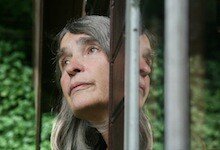Excavating the archive

‘To be heard, poetry needs to be sounded—whether in a process of active, or interactive, reading of a work or by the poet in performance’, writes American poet and critic Charles Bernstein in Close Listening: Poetry and the Performed Word. Recently we have seen a resurgence of poets—especially those often categorized as innovative or experimental—treating performance as integral to their written work.
Poetry's flourishing between the page and stage is evident in our current feature from the Poetry Society, which showcases the electrifying work of poet-performers Jo Bell and Kate Tempest, and of Steve Ely, a poet very much invested in and influenced by oral traditions. In these cases, the poems on the page might stand on their own, but they also function as a score or script, taking on new life depending on its production.
While these poets’ work feels fresh and novel, it also opens our eyes to poetry’s long, rich and global tradition of reaching its audience through performance. And we’re not just talking about the ancient bards singing of sea voyages, muses and meddling gods. As Bernstein’s book argues, rather than asking, ‘When did modern poetry readings begin?’ we might consider, ‘When did poetry cease to be presented primarily through performance? That is, When (if ever) did silent reading take precedence over live performance?’
It has been our own experience at Poetry International that the important social role of poetic performance is precisely what connects the world’s many poetic lineages and what most effectively translates across its various languages. Seeing a poet in person reading at our festival, or listening to their voice and breath in our online archive’s audio recordings, or watching as they handle their book’s pages or make eye contact with the camera (and us) in the video recordings, we feel most directly and irrefutably that poetry is alive. And it is in its performance—in its consideration of and interaction with an equally alive audience—that poetry becomes a public art, and therefore a potentially political, as well as immensely pleasurable, one.
Poetry International’s page for Dutch poet Judith Herzberg mentions, as an aside, ‘(once, reading her poem “Het wachten op de halte” during Poetry Night at Utrecht’s City Theatre, she had the whole house in stitches)’. ‘Waiting at the Bus Stop’ is a magnificent and excruciating poem even when read alone, but through this remark, we can imagine how the poem takes on a new kind of energy and momentum when the self-conscious inner monologue is transformed into public speech. Envision a packed theater in which everyone is thinking, and recognizes each other thinking, ‘This is me, too’.
In September’s Zimbabwe feature, we were introduced to several writers who consider performance to be part and parcel of their poetry. Akin to Herzberg’s reading, Batsirai E. Chigama’s recitation of ‘Sperm Box’ expands the comic power of her poem. The poem takes on the added absurdity of Chigama’s immensely personable and elegant voice reading the obscene found-text from her Spam folder. We also hear her actually laugh out loud, rather than read out the line ‘(laughs really loud)’, which gives us insight in how to take that line—whether as a language object or as a gesture, a stage direction.
Within our archive, some poems appear to be visual objects that are impossible to read aloud, such as Jerome Rothenberg’s ‘Old Man Beaver’s Blessing Song’, and K. Schippers’ ‘The Position of Moles in the Sky’. But the poets impressively rise to the challenge. In Rothenberg’s case, we are no longer sure if his reading is a performance of the text, or if the text is a transcription of the performance. Schippers’ recording recalls John Cage’s 4’33, in that he reads the title, remains silent for the length of reading the poem and then concludes with the rustle of turning pages. But in that silence, we also hear the breath of the poet, we hear snippets of his movements, and these become an aural constellation, the position of the poet in the sky.
In some of Poetry International’s earlier videos, festival poets were asked to read their poems in various locations around Rotterdam, and it is worth seeing how they, and subsequently their poems, end up engaging these spaces. Egyptian poet Ahmed al-Shahawi, reading the philosophical ‘Five Fragments for the Sadness of Great Figure’, fully embraces his surroundings—a hookah bar—and his reading devolves or evolves, depending on how you see it, into slow-motion shots of him blowing out large mouthfuls of smoke. American poet Umar bin Hassan takes a more mobile approach to his reading, getting out onto Rotterdam’s streets. Wearing a shirt emblazoned with, ‘THE LAST POETS’, he seamlessly transitions from talking to a woman in front of her car, to reciting the first lines of ‘Grace’: ‘Eyes open in the womb. The struggle arrives to turn darkness into light’. And it’s hard not to feel affinity with Slovenian poet Dane Zajc, as he tries to stifle a laugh while an exuberant accordionist plays next to him!
What we see in our audio and video archive, and in the vibrant new performance work done by poets around the world, is that a poem’s performance can be a powerful way for a poem to include and to direct our attention to the audience, environment and circumstances around it – another way in poetry becomes both international and universal. And this is a living tradition that demands to be heard.








